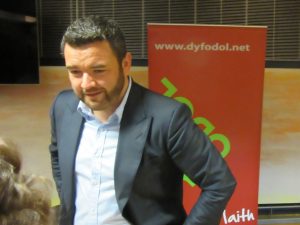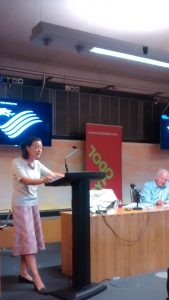Click on the link below for Dyfodol’s comments on the review of Welsh in Education Strategic Plans
Yearly Archives: 2018
DYFODOL WELCOMES SPENDING TO PROMOTE WELSH LANGUAGE EDUCATION
Dyfodol i’r Iaith has welcomed the Government’s decision to spend £51m on promoting Welsh language education.
Heini Gruffudd, the organization’s Chair said:
“We are very pleased to hear that funding is available to promote such a key need. We would like to emphasise however, that we also wish the Government ask local authorities to draw up schemes to develop Welsh language education over periods of 10 and 20 years to ensure far-sighted planning.”
“This expenditure has to be supported by a programme that allows for urgent action and intelligent long-term planning if we are to have an expansive scheme which makes a realistic contribution to the aim of creating a million Welsh Speakers.”
EISTEDDFOD 2018 AND DYFODOL I’R IAITH’S PRESENTATIONS
We hope you all enjoyed this year’s Eisteddfod in Cardiff Bay, and a warm thank you to all who attended our presentations. We hope you appreciated the content, and that you were given plenty of food for thought. We include below a summary of both presentations:
Gwion Lewis suggests how to make the most of the Welsh language in planning (08/08/18)
The principles of language planning must be incorporated into the planning system. The current situation is weak, and the Government is currently on the wrong track. Although the Planning Act (Wales) of 2015 took a step in the right direction in accepting the Welsh Language as a material consideration, much remains to be done.
These are Gwion Lewis’s main recommendations:
- More emphasis on community planning
Local planning already happens at the level of Local Developmant Plans, but this is on a wide scale. Another layer is needed, with the main decisions, such as the number of homes remaining the responsibilty of Local Authorities, but the decision over their location falling upon Community Councils (or an equivalent body).
More local power would ultimately empower communities to define the kind and mix of housing that would be most appropriate. Local Authorities do not have the resources to concentrate on local needs, and a more devolved system would allow better dialogue with developers, particularly as they are keen to avoid the cost of going to appeal. This situation would give communities more bargaining in setting favourable conditions in relation to the Welsh language and the kind of infrastructure to support it.
- Learning lessons from environmental legislation
Areas with a special environmental designation call for a complex approach and detailed assessment in relation to planning. There is no equivalent designation for the Welsh language – in Wales, the bottle-nosed dolphin is more protected than the language. There is therefore a need to press for the designation of areas of linguistic importance, and for the Welsh Language Commissioner to be given the power and expertise to advise on schemes for such areas.
- Abolish the illegal policy of the Technical Advice Note 20
Although the language is noted as a ‘material consideration’ in the 2015 Welsh Planning Act, the Technical Advice Note 20 prepared in relation to the language undermines this and works against any attempt at language planning. It notes that an assessment of the linguistic implications of planning applications should not normally be undertaken, except for large applications and applications falling outside the Local Development Plan.
This situation limits the protection of the language, undermines the law, and is not applicable to any developments beyond housing
Eluned Morgan AM elaborates upon the Government’s plans for the Welsh Language (10/08/18)
The latest plans are broadly based upon the Welfare of Future Generations Act, and more specifically on the aim to create a million Welsh-speakers by 2050. It was also noted that Brexit is a further factor and a threat
- The intention is to form a new language Commission with the expertise and confidence to promote the Welsh language. It was however noted that there was no intention to get rid of the language standards, only to simplify them. The intention was also noted that they be extended to the private sector
- The recent work on Welsh Language in Education Schemes is intended to form a basis for further work and closer links with Local Authorities. Partnerships with further education and the private sector also need to be strengthened and expanded for optimal results
- It is also important to increase the use of Welsh in relation to digital technology
- Since the numbers of those using the language drops as they get older, the use of Welsh language services must be promoted
- In an uncertain economic climate, resources must be used carefully; practical decision must be faced, such as deciding if the priority lies with translating documents or investing in more Welsh teachers
At the end of her presentation, questions were put to the Minister, and a summary of her responses follows:
- She agreed that Welsh-speaking workplaces were important and that in this context, she again confirmed that there is no intention to pull back from the language standards, but that there is a need to simplify the complaints process
- Responding to the relationship between the Commission and Government, she confirmed that the Government would be responsible for legislation and the wider policy framework, but that the work of promoting the language would fall upon the new Commission, as an arms’-length body. She wanted to see the Commission work based on the principles and expertise of language planning and hoped for a positive yet challenging relationship. The right to challenge and criticise Government would call for a degree of independence for the Commission
- Education would remain within the Education Department (for financial reasons) but with the Commission responsible for promoting Welsh-medium education
- In response to questions about the structure of the Commission, she confirmed that the details had not yet been decided, but that there would possibly be several Commissioners to reflect different areas of expertise. The Commissioners could work as a Management Board, with a Chief Executive and staff, but that would ultimately be a decision for the Commissioners themselves
- She agreed that the Commission would have to be powerful if it were to realize the aims of the Welsh Language Strategy
- In response to concerns about the interim – the period before establishing the Commission, she stated that she did not want to lose any momentum, and that the Commissioner would be appointed at the start of 2019. No new language standards will be introduced for now, the priority being the establishment of the Commission and striking the right balance between regulation and promotion
- Responding to concerns about land planning and the economy, she confirmed that the Commission would be expanding into new areas and agreed that better connections must be made between language and economic development, particularly in the context of Brexit and its effect on rural areas and the language heartlands.


